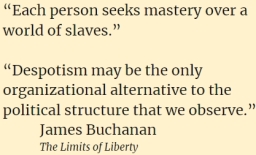 One major premise of public choice theory is “behavioral symmetry”.
One major premise of public choice theory is “behavioral symmetry”.
People act in their self-interest. They do what they believe will get them the most bang for the buck for themselves and their loved ones. This they do in the private sphere, such as in the supermarket.
Behavioral symmetry posits that when people act in the public sphere — as voters, politicians, bureaucrats — they also act in their self-interest. They don’t get transformed into other-directed, selfless beings capable of discovering what is true, beautiful and act solely in the interest of the “common good.”
As the economist James M. Buchanan stated it, politicians are people just like the rest of us. When a person moves from the supermarket to the polling booth, he does not necessarily leave his self-interest at the door. When a person gets elected to political office or is appointed as a bureaucrat, he should not be expected to even know, let alone act in accordance with, what’s in the “public interest” any more than can be expected of the supermarket shopper.
Considered that way — “politics without romance” as Buchanan formulated it — it’s reasonable to expect politicians to act precisely as the norms of the society dictate since they are part of the society that they are drawn from. Politicians act in the public interest (properly defined) only to the extent that society expects and allows them to do so.
